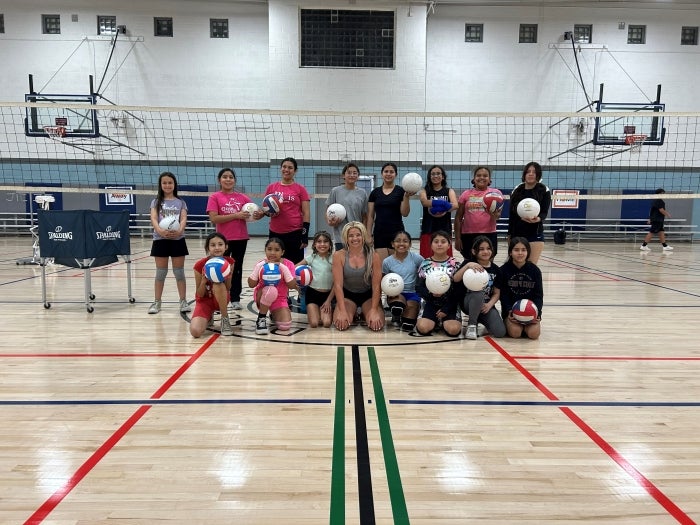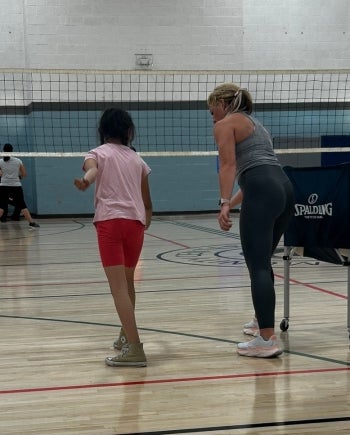Maryvale girls gain confidence through volleyball program

ASU graduate assistant and doctoral student Kailei Foltmer (center) demonstrates volleyball techniques to girls attending a clinic at Desert West Community Center in Maryvale, an urban village of Phoenix, Arizona. Courtesy photo
Life as a teen or tween can be tough, particularly for girls.
That's why an Arizona State University partnership with a community center in west Phoenix is building confidence in girls through teamwork, mutual support — and learning how to serve a volleyball.
Girls find navigating their young lives more difficult than boys do, according to a 2023 Centers for Disease Control and Prevention report. The CDC wrote that while all teens deal with growing mental health challenges, “girls fared worse than boys across nearly all measures” when it comes to navigating incidents of violence and suicidal thoughts and behaviors. In 2021, nearly three in five U.S. teen girls felt “persistently sad or hopeless,” the CDC said.
Officials in the Maryvale-based Desert West Community Center approached ASU’s Design Studio for Community Solutions, or DSCS, for help bringing families back through its doors after the COVID-19 pandemic kept them away. The center sought to expand its offerings.
DSCS Director Allison Mullady said the studio used funding from Mike and Cindy Watts’ 2018 gift to the Watts College of Public Service and Community Solutions to help attract girls to Desert West through teaching them the fundamentals of volleyball.
“One of the components of the Wattses’ gift was to support culture, arts and sports in Maryvale, where they grew up,” Mullady said. “Our partners at Desert West reached out to us with an idea of starting volleyball programs for girls.”
School of Community Resources and Development Associate Professor Eric Legg, an expert on youth sports, and Kailei Foltmer, a PhD student in the school, helped create the program. Foltmer served as coach as the first eight-week clinic launched in fall 2023.
“When I came in, we had 20 signed up,” Foltmer said. “It was a learning process. The girls were so excited to learn, be part of something and have that sense of community — especially the younger girls, 8 to 12, whom we were introducing to the sport. It gave them the confidence to be in sports.”
By spring 2024, Desert West was holding two clinics — a six-week clinic that had a full waiting list, followed by an eight-week session — Foltmer said.
“They’re phenomenal,” she said. “I’ve watched the older girls take the younger ones under their wings and grow their confidence.”
The girls picked up on a simple, yet powerful, way to boost each other’s self-confidence: cheering for their teammates.
“The biggest thing I learned was how much cheering each other impacts their confidence,” Foltmer said. “When it’s super quiet, they are more nervous and they don’t do as well.”
Legg said the school is researching how sports participation impacts girls’ self-esteem, self-identity and relationships. One exercise asked the girls to draw pictures of themselves at school, at home and playing volleyball.
“It was interesting how in the volleyball pictures they were never playing alone, it was always with other girls, smiling,” Foltmer said. “The pictures of them at home were often of them alone.”
Foltmer cited a recent Women’s Sports Foundation study that found a sizable number of girls drop out of sports by puberty due to social stigma, lack of opportunities and lack of role models.
Foltmer said girls now want to keep coming back to the center.
“One athlete wouldn’t talk to anybody at first and was kind of shy and timid. But by the third session, she was volunteering to have a younger one be her partner.”
Legg said that Foltmer is also helping to develop the program structure to ensure its long-term sustainability.
Mullady said ASU will fund the program through June 2025 before the community center takes it over completely.
“Having Kailei there as a model not only for the girls but to support the staff sustains it longer-term, making it a part of the community to help girls who don’t have skills in particular sports,” Mullady said. “Now we’ll see if it expands into other sports or an ongoing internship opportunity for other SCRD students to continue after next year.”
Foltmer said it’s critical to reach out to girls at this particular time in their lives.
“It is such an important age where it’s all about empowering the girls and giving them confidence. Even if they have little to no experience, it’s important for them to keep working and trying, instead of making it so competitive that they don’t have that confidence, increasing the dropout rate,” Foltmer said.
While competitive measures such as keeping score aren’t part of the clinics, Foltmer said as the season ends the girls will play an exhibition game for family and friends.
“All the families get to come,” Foltmer said, “and everyone comes: grandparents, aunts, uncles, to see everything they’ve learned.”
More Arts, humanities and education

2 ASU professors, alumnus named 2025 Guggenheim Fellows
Two Arizona State University professors and a university alumnus have been named 2025 Guggenheim Fellows.Regents Professor Sir Jonathan Bate, English Professor of Practice Larissa Fasthorse and…

No argument: ASU-led project improves high school students' writing skills
Students in the freshman English class at Phoenix Trevor G. Browne High School often pop the question to teacher Rocio Rivas.No, not that one.This one:“How is this going to help me?”When Rivas…

ASU instructor’s debut novel becomes a bestseller on Amazon
Desiree Prieto Groft’s newly released novel "Girl, Unemployed" focuses on women and work — a subject close to Groft’s heart.“I have always been obsessed with women and jobs,” said Groft, a writing…



